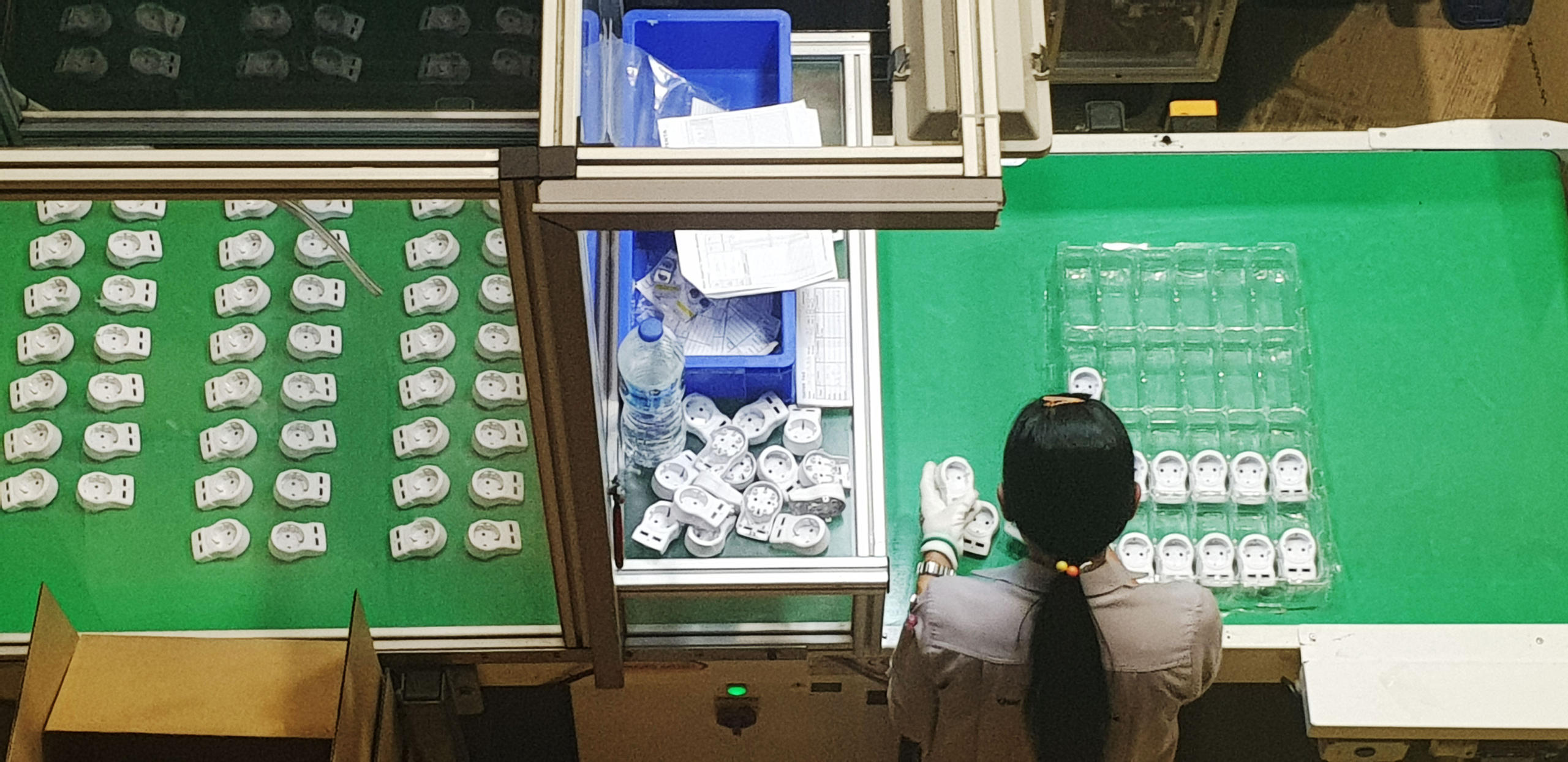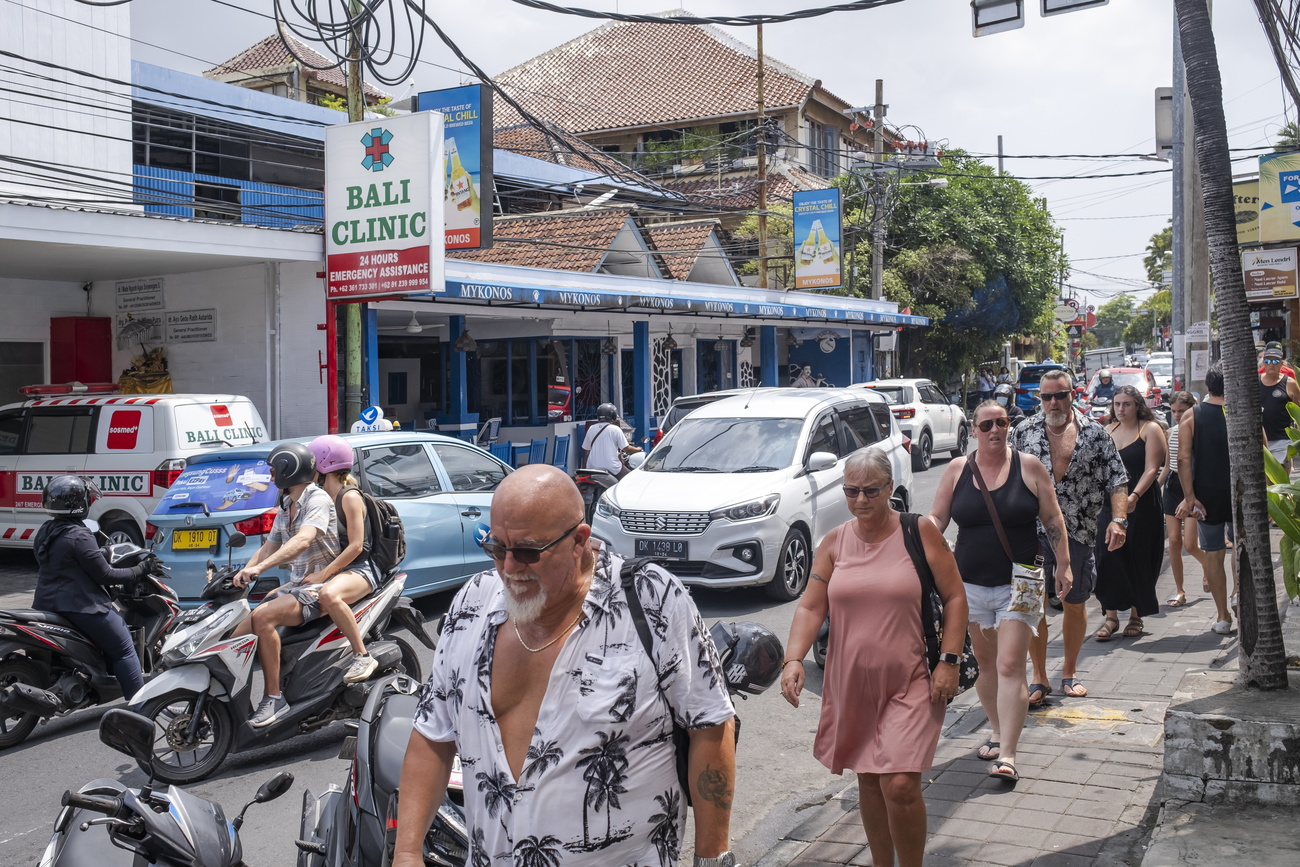Swiss citizen triggers uproar in Thailand

A Swiss man living in Thailand lost his temper for a moment and sparked an unprecedented hate campaign. The Thai authorities have been forced to act.
Now that the matter is in the hands of the Phuket public prosecutor’s office, the actual incident seems insignificantly small. It is a minor offence that will probably be dealt with in administrative proceedings. The outcry has also abated. “Media attention has turned back to other current issues,” says Swiss ambassador Pedro Zwahlen.
Until very recently, however, a public storm raged – the likes of which has rarely involved a Swiss Abroad. The anger was directed at an expat from canton Aargau, who is known only as David* in Phuket. He is 45 years old and runs an elephant park there.
David is a mountain of a man, tall and 110 kilos. Before moving to Thailand, he worked in the security industry. In the latest photos, his eyes are red and bloodshot – the result of sleepless nights and constant stress.

More
Newsletters
Over the years, David has built up his business in Thailand with visitor admissions. Things are going well. He rents a villa on the beach. According to the Thai media, he pays ten average Thai annual salaries as monthly rent. He is obviously making a fortune.
“If many foreigners and tourists are wealthier than the local population, tensions automatically arise,” says Marc Faber, a Swiss expat who has been living in Thailand for 25 years. Before that, Faber spent decades in Hong Kong; he knows how things work in Asia.
Faber is a flamboyant investor, known far beyond Switzerland as Dr Doom, because he saw stock market crashes coming. And like everyone else living in Thailand, he knows every detail about the David case, as it was the top story of every news programme for weeks. The accusations against him dominated the headlines; hatred towards him pervaded the internet. Faber’s analysis is sober: “In Thailand, the case was so big also because it smacked of police corruption.”
Flight of steps
It all started on a Saturday evening, February 24, 2024. This is a public holiday, the day when Thailand honours Buddha’s teachings of humility. A full moon was shining over Cape Ya Mu, a little-visited beach near Phuket that is also known for its luxury villas. A 26-year-old doctor was sitting with a friend on a flight of steps by the beach. The steps lead up to David’s rental villa.

All beaches in Thailand are public. The steps in question are on the boundary between private and public land.
What happened next can be seen in video footage that David later published in his defence. He recorded it himself. At first, his shadow is clearly visible. It moves towards the two women in the darkness. When he reaches them, the camera begins to wobble. At the crucial moment, the picture is too shaky to make anything out.
On the soundtrack, the following three things happen within a single second: David shouts “Get the fuck off!”. There is a muffled thud. A female voice groans.
The scene then becomes quiet again. The two women get up and disappear into the night, while David shouts the same expletives after them twice.
Livestream goes viral
Shortly afterwards, the doctor starts a Facebook livestream. She reports that she was kicked in the back by a foreigner. This goes viral.
Later, the doctor tells the media: “He looks like a rich man, I’m just a little doctor. He’s a stranger living in Thailand. He earns his money with Thais, works here, lives on our soil.”
At a press conference one week later, David himself says that he tripped. He may have touched the woman accidentally, but he never kicked her on purpose.
If one believes the young doctor’s account of events, there is almost no taboo that David has not broken in the eyes of the Thai public.
A man attacks a woman. He kicks her with his foot, which is the absolute lowest and dirtiest part of the body in the Buddhist faith. She is a doctor, a profession that is held in the highest esteem in Thailand. And the man who behaves like this runs a park with elephants, Thailand’s sacred animal.
“All the facts come together,” a local lawyer who has been following the case tells SWI swissinfo.ch. He knows another ingredient that fuelled the storm: the social media obsession of the Thais, who on average spend over five hours a day scrolling through social networks. “Thais are peaceful people, but when something happens, they can act extremely, even unreasonably,” the lawyer says. “And this case had everything about it to go viral.”
Complex relationship with foreigners
“It takes a lot for things to boil over in Thailand,” says Lukas Messmer, Southeast Asia correspondent for Swiss public broadcaster, SRF, in Thailand. Messmer also describes the people in his host country as reserved and the society as highly stratified. “But inhibitions fall faster on social media.”
He also notes the complex relationship between locals and foreigners. “On the one hand, tourism accounts for nearly a quarter of the gross national product, but on the other hand it causes problems.”

More
‘Swiss expats’ expectations are too high’
In Phuket, a tourism hotspot, this situation has been exacerbated since the mass arrival of Russians. One million Russians visited last year alone. And ten thousand have taken up residence to set up their own tourist business for their compatriots.
This is a breach of taboo, for Thailand had managed until now to keep tourism in local hands thanks to strict rules. But it seems the Russians are only partially adhering to these.
They open hotels or restaurants without the mandatory local participation. “In some parts of Phuket, they have taken over the local economy,” says Messmer. This stirs up envy and resentment towards foreigners, which already existed to an extent.
Too lax for too long
How was this Russian boom possible? SWI swissinfo.ch also spoke to Swiss expats in Phuket. They paint a consistent picture: all these breaches, whether big or small, would not be possible without some collusion by the authorities.
Nobody likes to talk about corruption, but Faber in Chiang Mai uses the word. According to him, the police in Phuket have a particularly bad reputation in this regard.
The local lawyer, who is familiar with the case and is assessing it anonymously for SWI swissinfo.ch, supports this theory. “The authorities wanted to take back control.”
Clearly, too many things have been too lax for too long, including the luxury villas on the beach that have spread onto public land. Money supersedes the law.
The resentment towards foreigners who get away with everything is now unleashed on one person: David. He is the perfect victim.

The drama is already in full swing when David provides further fodder. On the evening before he appears in front of the media to apologise publicly, he posts his video online. He wants to explain himself. However, the 17-second film becomes grist to the mill for the already rampant hatred against him. On YouTube, in the media, on TV stations and on social media, the floodwaters are now unleashed.
Threat to call the police?
The whiff of corruption is perhaps the decisive ingredient that finally sparks full uproar. After the incident, the young doctor reported something outrageous, a statement made by David’s Thai wife. Right after the incident, she allegedly told the doctor that she could “shoot her and her friend” without getting into trouble, because her son was a “powerful police officer”.
And indeed, David’s partner’s son is a police officer. She later says that during the argument she merely suggested calling the police to defuse the situation.
Whether the doctor’s statement is true or not, the effect is the same: the authorities must act. For one question now looms large: does money really supersede all laws?
Police must defend themselves
It turns out that the steps where it all began are on public land. David could not actually have known this, as he only rented the villa. But this no longer matters.

A protest picnic attracts hundreds of Thais to the beach steps. They sing the national anthem. Then an excavator comes and demolishes the steps.
At the beginning of March, a Swiss man in Thailand beat up a local woman in public. Thai and Swiss media linked the two cases in their reporting. Pedro Zwahlen, the Swiss ambassador to Thailand, noted “many negative statements directed at the Swiss directly involved and sometimes also crude and unfounded generalisations about the entire Swiss community in Thailand”.
He says the absolute majority of Swiss nationals who visit Thailand or have settled here behave in an exemplary manner. “They characterise the extremely positive image of Switzerland in Thailand on a daily basis and are a central component of the friendly relations between the two countries.”
The police have to fend off “mafia” accusations. Suddenly everyone is taking the case very seriously. The prime minister orders an investigation. The governor of Phuket has to cancel a trip to Germany on the orders of the interior minister. The parliament also discusses the matter.
The Thai authorities take other immediate measures. David loses his residence permit, his work permit and his gun licence, which he had obtained for the zoo.
They then also scrutinise David’s elephant park and its sponsoring foundation. It is regarded as a flagship tourism project. Despite meticulous examination, the Thai authorities, observed by numerous media outlets, find no evidence of corruption or other wrongdoing. The accounts comply with the law. There is no reason to revoke the park’s licence. On the contrary, it is even renewed three weeks after the incident.
In parallel, a criminal investigation is under way. David is accused of the lightest possible offence against physical integrity, known in Swiss criminal law as “assault”.
The local lawyer, who is assessing the case anonymously for SWI swissinfo.ch, doubts whether the offence in question justifies withdrawal of the residence permit. Josef Schnyder, delegate for the Organisation of the Swiss Abroad for Thailand, also wonders: “Can Thailand expel someone without a conviction? This raises the question of the rule of law. In this case, the person would lose their property.”
Swiss embassy does not step in
Meanwhile, the Swiss embassy in Bangkok has decided not to intervene diplomatically with the local authorities. In response to an enquiry, the Swiss foreign ministry replied that it cannot intervene in court proceedings abroad as it respects the legal system of the receiving state.
“This incident does not affect the traditionally very friendly and good relations between Switzerland and Thailand, which have developed over many decades,” says Pedro Zwahlen, the Swiss ambassador to Thailand.
It remains to be seen what the Thai judiciary will decide. The set bail gives an indication, however. It is strikingly low: 1,000 baht, or CHF25 ($27). This also happens to be the entrance fee to David’s elephant park.
*David is a pseudonym. His full name is known to the editorial staff. He and his lawyers are not commenting on the case, citing the ongoing proceedings.
Edited by Reto Gysi von Wartburg. Adapted from German by Julia Bassam
Pedro Zwahlen, the Swiss ambassador to Thailand, has the following tips for travellers and people emigrating to Thailand:
Consult travel advice and enquire directly with the Thai embassy in Switzerland regarding applicable visa requirements. Health and travel insurance with sufficient cover is essential to avoid financial worries in the event of hospital treatment or a necessary repatriation. If you have pre-existing medical conditions, it is essential to clarify which costs will be covered.
Swiss nationals travelling to Thailand must be aware that they must comply with local laws. It is important to understand that legal regulations in Thailand, for example regarding the possession and use of drugs, are strictly enforced and can have serious consequences.
Respectful and polite behaviour towards the locals and their culture should go without saying. In Thailand in particular, this also includes appropriate dress at religious sites and respectful behaviour towards symbols of royalty.
When riding motorbikes and scooters in Thailand, Swiss nationals should always wear a helmet. This also applies to passengers. Thailand has a notoriously high number of serious road accidents, the majority of which involve motorcyclists. Tourists are often affected.

More
Switzerland to Thailand: what it takes to move a family across the globe

In compliance with the JTI standards
More: SWI swissinfo.ch certified by the Journalism Trust Initiative












You can find an overview of ongoing debates with our journalists here . Please join us!
If you want to start a conversation about a topic raised in this article or want to report factual errors, email us at english@swissinfo.ch.